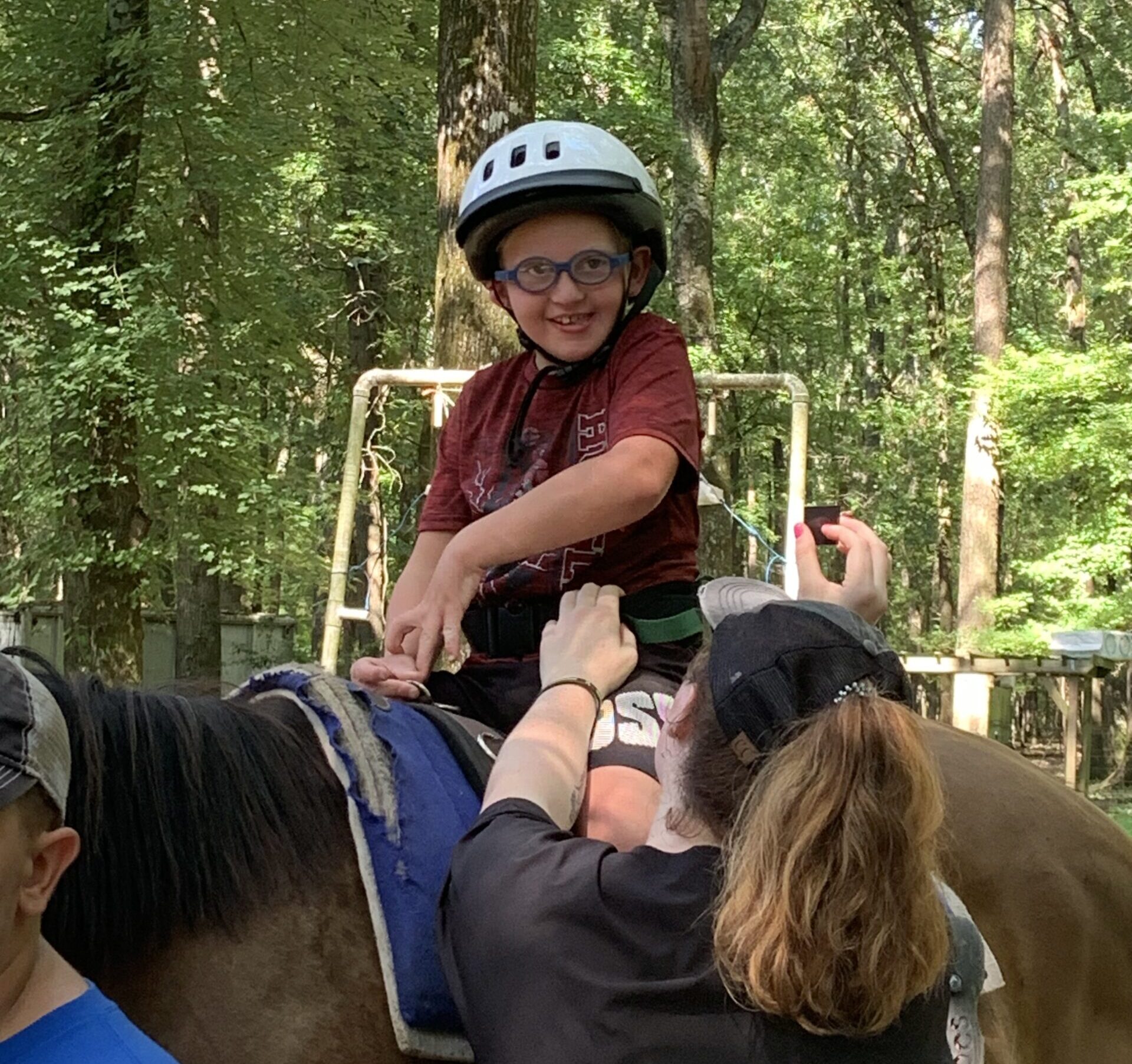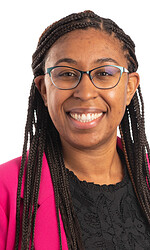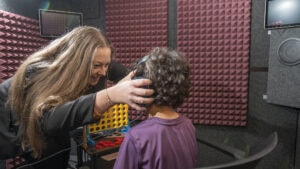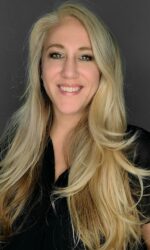Spotlight on the Department of Audiology and Speech-Language Pathology
| Doctor of Audiology Program
The UAMS Doctor of Audiology (Au.D.) Program is the only Au.D. program in Arkansas, dedicated to equipping students with the skills necessary to navigate the dynamic and evolving field of audiology healthcare. In the past three years, the program has undergone significant growth, successfully recruiting new faculty members boasting diverse expertise and backgrounds, as well as moving to the department’s new academic and clinical space on the UAMS campus.
Among the notable faculty additions is Dr. Bryson Howard, AuD, CCC-A, CH-TM, who returned to his graduate alma mater in the fall of 2019. With extensive experience in the Veteran’s healthcare system and a specialization in tinnitus management, Dr. Howard contributes a wealth of practical knowledge to the program and is responsible for coordinating the program’s in-house clinic.
In April 2020, Dr. Charia Hall, AuD, CCC-A, a UAMS alum, joined the faculty bringing an expertise in educational impacts of hearing loss and auditory processing disorders. In the fall of 2023, Dr. Hall took over the role as Program Director and hopes to continue to grow the program offerings and its reputation in the state.
Besides the return of Dr. Howard and the promotion of Dr. Hall, the department has added several new, talented faculty members:
- Caitlin Price, AuD, PhD, CCC-A, an addition in August 2021, brings expertise in clinical diagnostics, amplification, and electrophysiological measures.
- In July 2023, Dr. Lipika Sarangi, PhD, joined bringing with her a focus on amplification and patient outcomes.
- Madison Howe, AuD, CCC-A, appointed in August 2023, fills the role of Clinical Education Director, and has extensive knowledge and expertise in pediatric diagnostics and intervention.
While not a new hire, Dr. Samuel Atcherson, PhD, CH-TM, FNAP provides a wealth of historical knowledge for the program, being a faculty member for over 15 years, but he continues to learn and grow to provide additional resources and expertise to the program. Dr. Atcherson recently became certified in tinnitus management and vestibular management and plans to provide clinical opportunities for students in these areas.
Complementing the six full-time faculty members, the program has five adjunct faculty, each specializing in a different area, such as: implantable devices, vestibular disorders, private practice management, hearing conservation, and the acoustics of sound. This ensures that students are gaining well-rounded didactic knowledge in tandem with their clinical skill development as well.
The Au.D. program offers diverse clinical opportunities spanning pediatrics to geriatrics in various settings such as hospitals, private practices, and ENT clinics. This comprehensive approach ensures students acquire a well-rounded clinical experience, preparing them for practice in any setting post-graduation. The program works diligently to build partnerships and clinical affiliations within Arkansas and neighboring states.
With a commitment to excellence, the Au.D. program prepares students for entry into the career field of audiology. Demonstrating a steady first-time pass rate for the national Praxis exam and a 100% employment rate post-graduation across all cohorts, the program stands as a beacon of success in audiological education and care for students, patients, and future employers.
Master of Science in Communication Sciences and Disorders
Communication abilities can profoundly affect relationships and how effectively a person interacts with the world. Communication impacts every aspect of the human experience.
The UAMS Master of Science Program in Communication Sciences and Disorders (i.e., Speech-Language Pathology Program (SLP) provides comprehensive academic and clinical training to prepare students to become competent, responsive, and adaptable Speech-Language Pathologists. The program’s curriculum is designed to incorporate classroom instruction and supervised clinical experiences during every semester to foster integration of knowledge and skills.
Dana Moser serves as the Program Director, and Shana Williamson serves as the Director of Clinical Education. The program has extensive relationships with clinical preceptors and externship sites so that students have the opportunity to experience with diverse and specialized clinical settings and populations.
Each year, the Speech-Language Pathology Program admits approximately 24 new graduate students in the fall to begin our five-semester program. During their first two semesters, graduate student clinicians provide services to the community in the in-house clinic under the supervision of highly trained faculty. This model allows students to gain confidence and skills while being shepherded by certified clinical instructors.
The in-house speech and hearing clinic provides students with supervised clinical experience in assessment and intervention while also meeting a service accessibility gap for many clients. One thing that makes the clinic unique is the number and diversity of their group programming.
The Preschool Language Enrichment Program (PLEP) is a program for children from birth to 5 years with speech and language delays. It includes three groups based on age: birth to 18 months, 18 months to 3 years, and 3 years to 5 years. These groups meet twice a week and focus on developing communication, receptive and expressive language, social interactions, pre-literacy activities, and feeding skills.
The Social Communication Groups, often referred to as Sociables, includes four groups based on age: 5-8 years, 9-12 years, 13-16 years, and 17 years and up. These groups focus on social interactions and skills relevant for the respective ages, from engaging in play activities to workplace interactions.
The Aphasia Groups assist in improving life participation in adults with language difficulty following stroke or brain injury. The focus of these groups may vary by semester (e.g., conversation, reading, photovoice) as they are frequently integrated with clinical research studies.
The Transgender-Gender Affirming Language and Communication Group (TLC) is intended to facilitate the acquisition of the adult client’s preferred voice and communication style while providing support and community.
The Literacy Group is designed to improve literacy skills in students in grades K-5 who demonstrate difficulty with reading (decoding and word-identification), comprehension, and spelling.
The Accent Management Group provides education, support, and communicative practice to adults who desire to change or modify their communication.
The program is grateful for the partnerships they have built with clinical affiliates and they are essential in providing students with diverse clinical training. During the last three semesters of the SLP Program, students gain clinical experience in at least three other clinical settings thanks to the support of clinical affiliates throughout central Arkansas. These partnerships include hospitals, rehabilitation centers, skilled nursing facilities, private practices, schools, and others. This past year, the SLP program added a new affiliate, Harmony in Hooves, which provides supervised clinical experiences to our students utilizing hippotherapy, which utilizes the natural gait and movement of a horse to provide motor and sensory input.
Although there have been changes to the professional standards, the SLP Program has continued to excel at preparing students for clinical practice with a 100% pass rate on the national Praxis exam and a 100% employment rate post-graduation.



